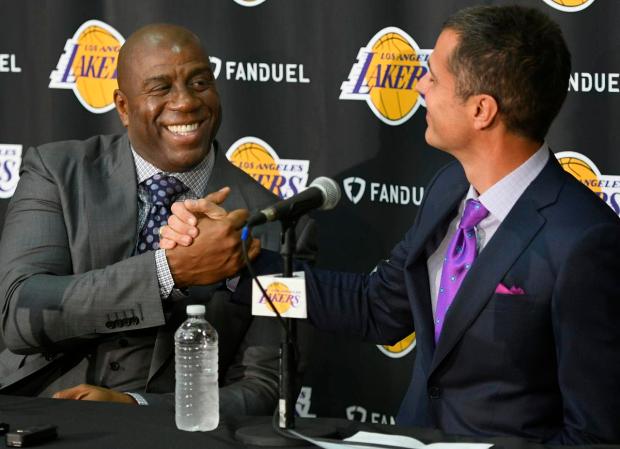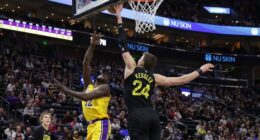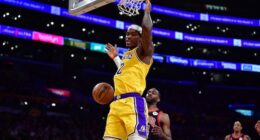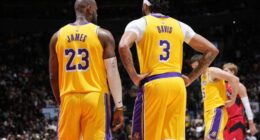New Yorks Knicks President and former Lakers coach Phil Jackson, along with Knicks GM Steve Mills, sat down recently for a wide-ranging interview with the New York Times. They touched on everything from the abysmal 2015 season to Isiah Thomas’ new – and wholly inappropriate – role with the Liberty to the definition of “gionk.” (While I was surprised Phil went there, the word does appear in the Urban Dictionary as he claims.) Insofar as the conversation’s connection to the Lakers, my attention was grabbed by inevitable questions about the triangle:
Q. The team won 17 games, and Carmelo Anthony is coming off knee surgery. How are you going to sell the Knicks as an appealing destination to free agents?
JACKSON I don’t think the offensive system has to take a back seat to anything we do. We’re looking for people who want to play a full basketball game, that want to be able to make plays, that want to be able to do things that are a credit to their skills. I think people that want to play the full game have seen that demonstrated, and if they’re interested in doing that, they know that this system can feature what they can do. And we have people who are interested. So we feel good about that.
Q. Do you anticipate players being resistant to the idea of running the triangle?
JACKSON Players who are resistant to it shouldn’t be here. Guys who want to play basketball and feel comfortable with their skills should understand that there is ample opportunity to play a game that’s an evolved game. It’s a thinking man’s game. It’s a logical game.
MILLS If Phil says we need to get a big guy, well, we just sat in a film session with four big guys who watched the way a big guy operates in the triangle, and I think it’s a lot more attractive than a lot of the basketball that they’ll see other teams play.
JACKSON We’re trying to find players who are the best fit for us. We’re really chasing as much information as we can. We’re not interested in guys who are just interested in the money and in their branding. They have to have a little more to their life than just those selfish desires. There’s nothing wrong with chasing money, and there’s nothing wrong with making the most from your name. But that seems to be the running theme that you see a lot these days.

Given the Knicks’ horrendous season, and (in my opinion) the longshot odds of signing experienced A-listers capable of making a Pau-esque triangular transition, it’s fair to question whether the triangle makes any sense whatsoever for a rebuild. Not because, as some dopes maintain, the triangle only succeeded because of the presences of Jordan, Kobe, Shaquille, Pippen, et al, because that’s nonsense. (While having them obviously helped, the system preaches principles like spacing, off ball-movement, and quick, decisive ball movement, ingredients that fueled the Golden State Warriors’ title run.) However, it is fair to wonder whether the triangle’s methodical, slow-paced, half-court foundation meshes with the current – and future – generation of NBA players bred on run n’ gun small ball. The question that truly matters isn’t the triangle’s validity, (a point equally appropriate to both The Zen Master and the triangle’s detractors), but rather its practicality. The triangle could be basketball genius. It could be a mirage fueling Jackson’s legend. Neither answer actually matters if the NBA isn’t flush with players equipped to run it. And given the current landscape, I think that’s a very distinct possibility Jackson refuses to acknowledge.
If so, the Knicks’ woes could be extended several more years because ideology and philosophy are being prioritized ahead of reality.
— Have you seen the ‘Bleed Purple and Gold’ phone case? —
What does this have to do with the Lakers? Hopefully nothing. However, as this organization attempts to conquer a brave new world featuring a CBA designed to prevent the Lakers from purchasing titles, all without the guiding hand of Jerry Buss, I’ve often detected a distinct “that’s the way we’ve always done it” vibe. For example, a still-injured Kobe gets his extension because the Lakers have always rewarded their stars. There’s an unwillingness to concede, then execute, a transparent rebuild because they’ve always been about “we don’t rebuild, we reload.” It’s a star-centric mentality that sparked an offseason focused on LeBron (who was never coming) and Melo (who thankfully didn’t), while young building blocks like Eric Bledsoe and Greg Monroe were left to the wayside because their names aren’t as sexy. Why? Because the Lakers have always been about stars first, second and fourteenth.

On the other hand, there are questions about whether he and Julius Randle, another low block player, could prove redundant offensively. More importantly, that pairing has some predicting disastrous results on the defensive end, and Okafor has questions marks along these lines regardless of frontcourt partner. In a league increasingly valuing speed over size, it’s easy to envision Okafor a lumbering liability benched down the stretch of games. While I do think the “death of the NBA big man” narrative is a bit overstated, it’s fair to argue size has emerged more specifically critical on the defensive end. A mobile big man capable of rebounding and protecting the rim will always have his place no matter the en vogue style. But Okafor is largely regarded as the polar opposite player, which could potentially render him a talented guy who landed in the wrong era.
These are the issues for Mitch Kupchak, Jim Buss, Byron Scott and the other brain trust folks to tackle. Obviously, if you think Okafor can make strides defensively, or his potential shortcomings are offset by his talent with the ball, take him. If there are too many questions about him meshing with the NBA over the next 5-10 years, take D’Angelo Russell, who feels like a perfect match for a guard/wing-driven league. While I’m currently leaning towards the Ohio State point guard, taking Okafor hardly requires tons of justification. There are plenty of solid reasons.
What concerns me, however, is Okafor potentially being taken for the wrong reason: “We’ve always done it that way.” It’s a common cry for big men and the Lakers. Wilt, Kareem. Shaq. Pau. And for the older set, George. To be fair, the mantra in this context often comes more directly from fans and media than the front office. Okafor and Russell have received two workouts apiece, so unless the due diligence towards Russell is a smoke screen, there’s openness towards a guard. At the same time, the organization has appeared periodically insecure enough to make decisions based on fan reaction, and again, this base takes “big man heritage” seriously. I also don’t think I’m speaking out of line in declaring Scott an old school coach with a mindset more “1985” than “2015.” He’s yet to appear particularly simpatico with the modern NBA, which makes me wonder if he’s willing to buck what’s now “convention” based on his philosophy of “what the game is all about.” And if the front office honors that philosophy while making such an important decision, that’s the same thing as endorsing it. Honestly, it wouldn’t shock me if the front office fell back on their past as a means of creating future success.
Which isn’t to say Okafor, nor any big man, can’t be a part of future success. But how well he meshes with tradition is beyond irrelevant. It shouldn’t be an even slight consideration. Were there any indication Thursday’s eventual selection came in part as a nod to history, it will serve as the latest example of why I’m concerned the Lakers can’t adapt to the world as we know it, and will instead continue living in the world they once knew.
[divide]





